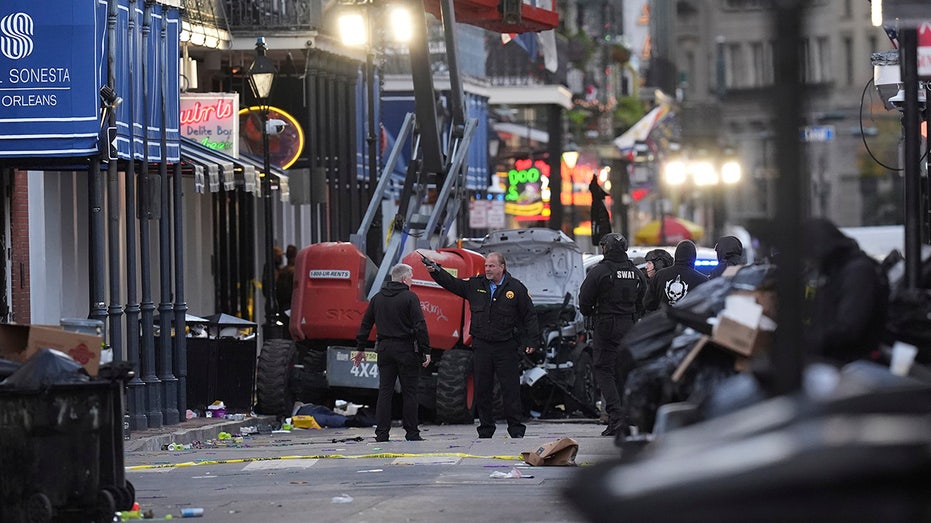- by foxnews
- 18 Mar 2025
U.S. threat landscape, domestic extremism pose a daunting-but familiar- test for Trump's second term
The Syrian government collapse and deadly attack in New Orleans could fan the flames for more Islamic State extremism.

During his first term as president, Donald Trump saw the height of a violent civil war in Syria, a resurgence of Islamic State activity, and a rise in ISIS-inspired attacks both abroad and on U.S. soil.
Eight years later, many of these bogeymen have returned.
And on Wednesday, U.S. authorities scrambled to investigate and respond to two separate attacks in New Orleans and Las Vegas. Despite taking place thousands of miles apart, both are being investigated as possible acts of terrorism-a glaring indicator that the threat of homegrown extremism remains just as pervasive as ever.
Options for Trump
He reiterated that view in a post last month on Truth Social, saying the U.S. should "have nothing to do with" the situation in Syria.
"Let it play out," he said.
It's unclear whether, or to what degree, this week's deadly attacks may have swayed Trump's decision. Fourteen people were killed in New Orleans early Wednesday morning by Shamsud-Din Jabbar, a Texas native and U.S. army veteran who had driven from Houston to Bourbon Street in a rented pickup truck, plowing through crowds of people massed outside the famed string of bars to celebrate the new year. Jabbar himself was fatally shot by police.
FBI officials said that Jabbar, who had affixed an Islamic State flag to the rented vehicle, was "100% inspired by ISIS" in carrying out the terrorist attack, though it remains unclear whether he has any legitimate ties to the group.
Separately, the FBI said they are investigating a Las Vegas explosion carried out in a Tesla Cybertruck outside the Trump hotel in Las Vegas as a possible act of terrorism.
Should Trump opt to maintain his longtime opposition to U.S. intervention in "foreign wars," there are other options he could take to try to crack down on violent domestic attacks. This could include cracking down on immigration- a policy long embraced by Trump and many Republicans in Congress-to prevent possible threat actors from crossing the border.
In fact, the Department of Homeland Security told reporters in June that it had identified more than 400 migrants from Central Asia and other countries who had been smuggled into the U.S. by ISIS-linked smuggling groups over the last three years, prompting a flurry of new arrests and "subjects of concern" designations.
Still, a border crackdown might not be enough to solve the problem, made especially complex by the role of lone-wolf threat actors and individuals who become radicalized online.
A pervasive threat
The FBI has focused heavily on the risk of terrorism posed by domestic and homegrown violent extremists, as it noted in its most recent "Worldwide Threats to the Homeland" report.
These small groups or individuals pose the biggest risk to national security, the report noted-often using easily accessible weapons, such as guns and cars, to attack so-called "soft targets," or groups of civilians gathered en masse at accessible locations.
The "greatest, most immediate international terrorism threat to the homeland" are individuals who have lived primarily in the U.S. and who carry out actions inspired by, but not at the express direction of, a foreign terrorist organization such as ISIS, the law enforcement agency said.
Early in December, the FBI and other authorities warned of a heightened risk of vehicular attacks by lone-wolf offenders during the holidays, noting in a shared bulliten that threat actors have "plotted and conducted attacks against holiday targets" in previous years, with likely targets including public places with "perceived lower levels of security" holding large gatherings.
The threat is also not going away. Trump's first term as president saw multiple attacks carried out by individuals pledging allegiance to ISIS or other jihad groups-even if they had not been operating at the direction of the group itself. These individuals were responsible for the 2016 Pulse nightclub shooting, the 2017 New York City truck attack, a 2017 machete attack at a Middle Eastern restaurant in Columbus, Ohio, and many more acts of violence.
And since 2020, the number of domestic terrorism investigations conducted by the FBI has more than doubled-a staggering rate that indicates both the scope and the complexity of the growing problem.
Speaking to reporters at a press briefing on Thursday, FBI officials said the suspect in the New Orleans attack, Shamsud-Din Jabbar, was "100% inspired by ISIS."
"First and foremost, let me be very clear about this point," the FBI Assistant Director of Counterterrorism, Christopher Raia, told reporters. "This was an act of terrorism. It was premeditated and an evil act."
- by foxnews
- descember 09, 2016
Travelers can hunt for million-year-old fossils and more valuable treasures in these spots
Travelers can dig up 66-million-year-old dinosaur fossils in New Jersey or mine for diamonds at an Arizona state park. See more U.S. locations where you can hunt for treasures.
read more





